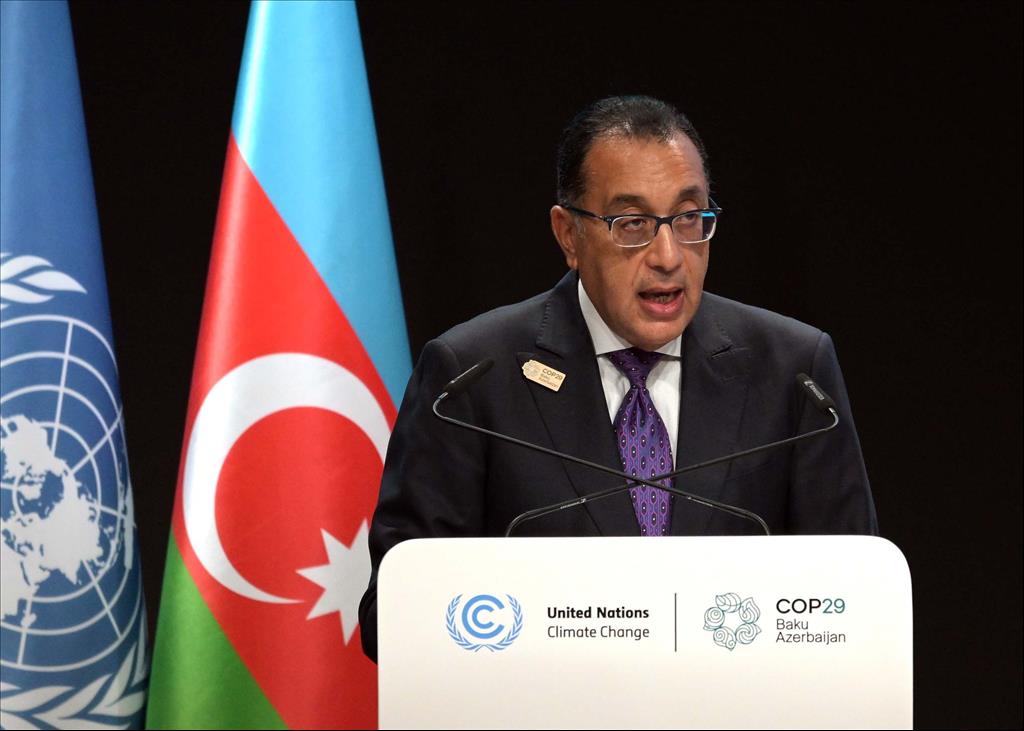
Madbouly Highlights Significance Of COP29 In Reaffirming Commitment To Climate Pledge 'Implementation'
Madbouly is participating in the high-level segment of the Conference of the Parties to the United Nations Framework Convention on Climate Change (COP29) on behalf of President Abdel Fattah Al-Sisi in the Azerbaijani capital of Baku.
He underscored Egypt's ongoing commitment to prioritizing the“implementation” of the climate change agenda. This includes addressing the climate-related losses and disasters that developing countries often struggle to manage due to a lack of financial and technical resources.
Madbouly noted that Egypt mobilized international support to establish a loss and damage fund during its presidency of COP27. They also launched negotiations focused on a just transition and included important social and economic considerations within the framework of the Paris Agreement. Furthermore, Egypt effectively promoted energy and water issues in the official conference decisions and established the Sharm El-Sheikh Platform for Partnership in Adaptation.
“Our conference serves as an opportunity to reaffirm the commitment of all parties to fulfill their pledges under the Framework Convention and the Paris Agreement. This is particularly crucial for ensuring the provision of financing to support developing countries. Reports from the Economic Commission for Africa indicate that African nations are allocating up to 5% of their gross domestic product to address climate change,” Madbouly added.
The Prime Minister emphasised that Egypt is committed to implementing an integrated national approach, to transition to sustainable and environmentally friendly development. This includes implementing the Climate Strategy until 2050 and the Sustainable Development Strategy until 2030, directing investments toward green transformation projects, enhancing cooperation with development partners, and increasing the production of new and renewable energy to reach 42% of the energy mix by 2030.
Madbouly pointed out that Egypt has launched a national platform and programme for projects under the“NWFE” platform. This platform encompasses priority projects, including water and energy projects, and it also facilitates the implementation of expansion operations in sustainable transportation projects in major cities, with the support of numerous development partners.
He pointed out that Egypt and African countries in general face the challenge of providing appropriate funding, the difficulty of accessing funding, and the conditionality of implementing accelerated procedures that do not take into account the social and economic conditions in our countries.
He continued:“In light of the conference's efforts to reach an agreement on the 'New Collective Quantified Goal' for climate finance, I would like to emphasize that developed countries must play the primary role of funding.”
Madbouly also emphasized that grants and highly concessional loans constitute the majority of funding. The inability to consider loans at commercial interest rates as climate finance, due to the resulting increase in debt burdens, necessitates addressing the difficulties in accessing the available funding.
He stressed the Egyptian negotiating team's commitment to providing all support to the Azerbaijani presidency to make the conference a success and achieve the aspirations we all aspire to.
On the sidelines of the conference, Madbouly met with Nardos Bekele, the CEO of the African Union Development Agency (NEPAD).
Madbouly affirmed Egypt's unwavering support for NEPAD, pledging to expand the agency's funding sources for the implementation of significant infrastructure projects under its supervision. He also pledged to mobilize donor countries to provide the necessary funding for NEPAD and its 10-year plan during the next phase.
The Prime Minister also stated Egypt's support for the agency's planned regional offices and the African Center of Excellence for Resilience and Adaptation to the Effects of Climate Change in Egypt.
For her part, Bekele pointed out, during the meeting, the importance of making the necessary efforts to follow up on the implementation of NEPAD programs through communication with the concerned African countries, expressing her aspiration to cooperate with Egypt in this regard.
She stressed the importance of establishing the African Center of Excellence for Resilience and Adaptation to the Effects of Climate Change in Egypt and its role in supporting development efforts and disseminating best practices in the field of adaptation, expressing her aspiration to establish the center as soon as possible.

Legal Disclaimer:
MENAFN provides the
information “as is” without warranty of any kind. We do not accept
any responsibility or liability for the accuracy, content, images,
videos, licenses, completeness, legality, or reliability of the information
contained in this article. If you have any complaints or copyright
issues related to this article, kindly contact the provider above.

















Comments
No comment